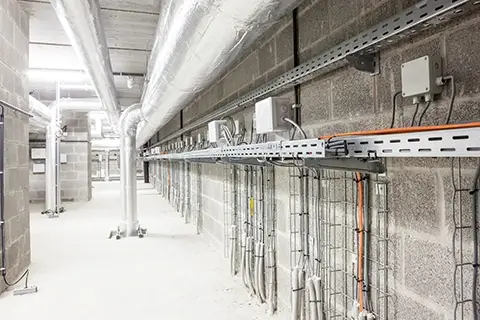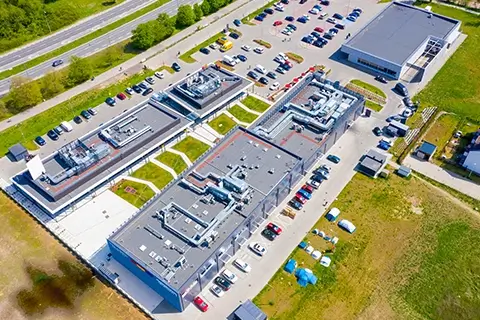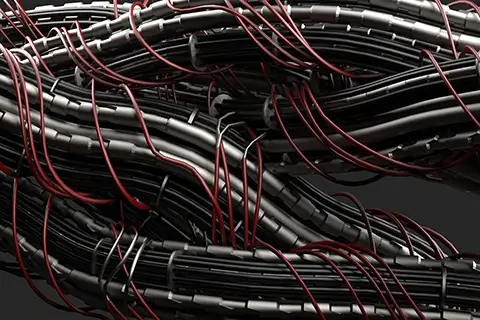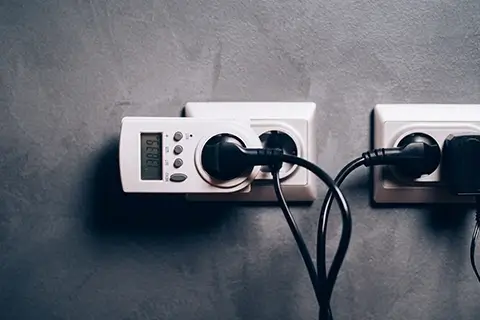Commercial, Industrial & Machine Electrical Wiring
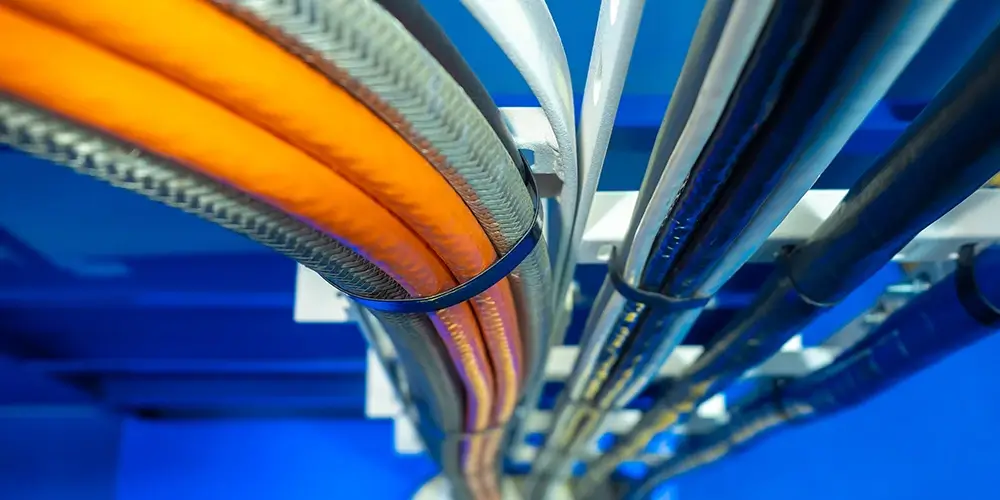
Commercial buildings have high electrical loads that compel higher building code standards. The typical residential building has 15 to 20 AMP services. A commercial building can have 200 AMP services or more.
Industrial buildings, with 800 to 5000 AMP services, have even higher building code standards. Safety standards are more stringent, as thousands of people may work and shop in a large commercial building.
For these reasons and more, specialist electricians should handle commercial and industrial electrical projects, not electricians for whom the bulk of business is residential repair.
G3 Electrical has wired hundreds of commercial and industrial buildings, from restaurants and hotels to factories and healthcare facilities. We know how to design and install electrical systems that can handle commercial equipment and workloads.
The jobs we perform most include:
- Commercial equipment & machine wiring
- Interior wiring & upgrades
- New commercial & industrial construction
- Remodeling of existing space or additions
- Outlets & switches
Our Customer Base for Wiring Contracts
- Hotels & motels
- Hospitals and health centers
- Office complexes
- Restaurants
- Retail stores & shopping malls
- Convenience stores
- Gas stations
- Warehouses
- Factories
- And more
We can design and install the wiring in your new building project, upgrade the wiring in an old building to bring it up to code, or remodel the wiring in your building to make it safer and more efficient.
Commercial vs. Residential Wiring
- Power demands for a commercial building can be high.
- Wiring in a commercial facility is housed in metal-clad (MC) cables, machine tool cable (MTC), or rigid metal conduit (RMC).
- Wiring is sometimes carried in the ceiling or rafters; in an industrial building, it may be completely exposed.
- Commercial and industrial wire has heavier insulation (TTHT wire), made of heat-resistant thermoplastic nylon. It can handle heavier loads without overtaxing the system or exposing it to fire risk.
- Commercial equipment may have wiring, motors, and switches housed in high voltage cabinets with arc flash controls. The wiring design can include a Wye, a 4-wire Wye, or Delta (no neutral wire) phase system as the voltage requirements for specific equipment can be as high as 408 volts.
- Commercial wiring must support electronics, appliances, and workstations throughout the building and offer the flexibility to organize spaces according to need and efficiency.
- Insurance on commercial or industrial buildings not wired to code might be void in case of fire or an electrical accident.
Types of Electrical Wire
All electrical wiring has protective sheathing. Residential wiring has comparative thin plastic sheathing (PVC) that works well for 120 or 240-volt wiring.
Commercial and industrial wiring, depending on use, must be able to handle up to 600 volts.
High voltage increases the risk of fire and electrocution; thicker sheathing offers a margin of safety. Most often, a container conduit provides additional protection.
Commercial and industrial conditions often demand thicker gauge wire. The conductor wire gauge also depends on the distance and draw of the connection.
The most common wire gauges are:
- 14 gauge for lighting circuits with 15 AMPs
- 12 gauge to power 120V outlets with 20 AMP circuits
Standard voltage and amp requirements are:
- 10 gauge for 240V, 30 AMP service
- 6 gauge for 40 to 50 AMP equipment
- 4 gauge for 60 or more AMP service
After silver, copper is the most efficient electrical conductor. Most commercial and industrial building codes require it.
Commercial electrical wiring often runs through open spaces, exposing it to damage, possible corrosion, and bug infestation.
All of this can lead to disaster for your business! At G3, we use metal conduits (MC, MTC, and RMC) to protect wires from exposure and damage.
3-Phase Electric Power
A single-phase residential power system supplies 120V of alternating current (AC) to a load via a cable containing three or four wires:
- Positive voltage (black),
- Neutral (white),
- Ground (copper or green)
- Optional two-way circuits (red)
The voltage alternates between positive and negative 120 times per second, or 60 times per second when supplied to a motor. Commercial buildings use single-phase power for offices, restrooms, and break rooms.
Commercial equipment needs more power than anything in your home. A three-phase system, carrying 240 to 600+ volts and designed in a Delta or Wye configuration, increases efficiency and helps equipment last longer.
- A 240V system has two “legs,” each containing two 120V wires.
- A 440V system would consist of two smaller legs carrying 120V each, while the third leg moves 220V.
Outlets & Switches in Commercial Buildings
Most commercial outlets are identical to residential outlets. However, they’re often configured differently to meet the needs of the business.
For example, a row of outlets may be placed along the baseboard in a conference room to provide power for laptops, projectors, and other electronic devices.
Special outlets and switches can control machinery in industrial settings and protect workers from possible electrocution.
GFCI outlets are designed to shut off power if they detect a difference in the current flowing through the hot and neutral wires. This is a vital safety feature in commercial kitchens where water may come into contact with electrical outlets.
Arc fault circuit interrupters (AFCIs) are another type of outlet that’s becoming more common in commercial buildings. They detect dangerous arcing conditions and shut off the power before a fire can start.
Commercial & Industrial Machine Wiring
When you add or replace commercial equipment, you may need additional electrical outlets, upgraded AMP and voltage capacity, and new safety devices to protect the equipment and workers.
G3 Electrical has connected commercial equipment in restaurants, hotels, health care facilities, industrial buildings, and manufacturing facilities throughout the Las Vegas Vally.
Homes have a few electrical appliances, but commercial buildings have dozens, if not hundreds, of machines that need to be wired to function. These machines include everything from air conditioners and elevators to computers and copy machines.
A single-phase source can power a typical 120-volt machine. Most commercial and industrial equipment needs a 3-phase system.
Upgrading Your Electrical Service
Expanding your commercial or industrial building may require upgrading your electrical service.
Call us if you’re considering a building expansion.
We’ll view your project plans and let you know what you need to do to accommodate the additional power requirements.
We’ll install new panels or subpanels to handle the load, add or upgrade wiring, and install new outlets and switches as needed.
We can also upgrade your electrical service to accommodate a future expansion. This will save you money and avoid having to call an electrician later.
Going Green
Businesses nationwide are under pressure to reduce their carbon footprint. They use approximately 40% of all energy in the United States! But the business benefit of reducing your carbon footprint significantly boosts your bottom line in terms of lower energy costs, tax rebates, and so on.
G3 Electrical can advise you on making your commercial or industrial building more energy-efficient. We’ll install new, more efficient lighting and upgrade your electrical system to accommodate new equipment, including battery power storage walls that allow you to store solar and cheap energy.
Why Hire a Commercial Electrician
Not all electricians are the same! Commercial and residential electricians aren’t interchangeable, any more than bus drivers are interchangeable with pilots.
- Commercial and industrial electricians must abide by much stricter NEC and building codes.
- They deal with different materials on a much bigger scale.
- The longer you’re in the business, the more you can design effective systems and head off potential problems.
- That’s why it’s critical to hire an experienced commercial electrician, like the electricians at G3.
Wiring a 20,000 square feet office space requires much more planning than a 1,500 square feet home. Can your electrician read an architect’s blueprint? Or have experience dealing with architects and general contractors?
The stakes are much higher when a business is on the line. Shoddy electrical work could shut down your business for a time or, even worse, lead to fire, severe property damage, and even injury or death.
G3 Electrical has over 50 years of combined experience in commercial and industrial electrical work. We’re familiar with all the latest technologies and NEC code changes. Our electricians are highly skilled and have the expertise to complete your project on time and within budget.
Call us today for a consultation!
G3 Is a Qmerit-Certified Electrician
Qmerit-certified electricians are:
- Properly licensed, fully insured, and thoroughly background-checked.
- Compliant with all applicable worker’s compensation guidelines.
- Required to secure permits to verify that installations meet local building codes.
- Teamed with industry experts for training on the latest technologies.
Only select electrical service providers earn the exclusive Qmerit certification, a symbol of excellence in electrification. You can depend on Qmerit-certified partners to provide trusted installation solutions that meet the highest standards for safety and service quality.
